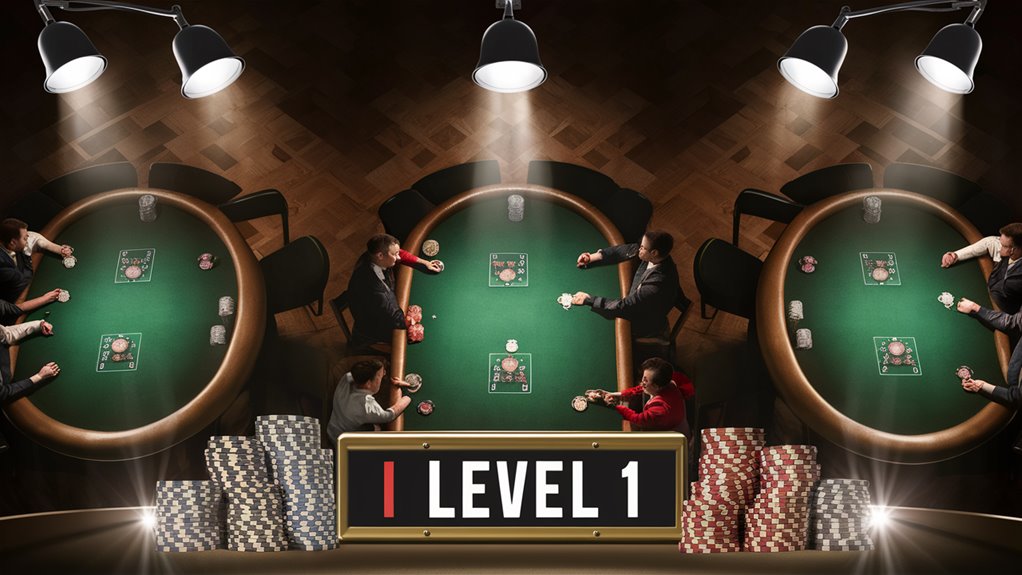You know what’s interesting about casino tournaments? You don’t actually need a fat bankroll to come out on top. Let’s be honest – most people think you need thousands of dollars to compete, but that’s just not true. Starting small can actually give you a leg up.
Think about it like learning to drive. You wouldn’t jump straight into a Formula 1 race car, right? The same goes for casino tournaments. Those smaller buy-in events are perfect training grounds where you can get comfortable with tournament dynamics without sweating about your mortgage payment.
I’ve seen so many players rush into high-stakes games, hoping to become overnight millionaires. But here’s the thing: the real pros, the ones who consistently make money, usually started at the bottom. They built their skills one small tournament at a time.
Want to know a secret? Lower-stakes tournaments often have softer competition. While the big shots are battling it out at high-roller tables, you can be quietly mastering your craft against less experienced players. It’s like getting extra practice time while everyone else is trying to show off in the spotlight.
The best part? When you eventually move up to bigger events, you’ll have 사설토토사이트 추천 something invaluable: experience without the emotional scars of big losses. Take your time, learn the ropes, and focus on improving rather than impressing. That’s how you build a solid foundation for tournament success.
Choosing the Right Tournament Format

Let’s talk tournament formats, because picking the right one can make or break your casino experience. You know how there’s always that perfect shoe for every occasion? Well, it’s the same with casino tournaments – you’ve got to find the one that fits just right.
First up, we’ve got elimination tournaments. Think of these as the marathon runners of the casino world. You start with one stack of chips, and when they’re gone, that’s it – game over.
If you’re the type who likes to play it cool and wait for the perfect moment to strike, these tournaments are right up your alley. Just remember to keep something in reserve for when the field thins out.
Now, rebuy tournaments are more like having a safety net. Bust out early? No problem – you can jump right back in by purchasing more chips.
These games tend to get pretty wild, especially early on, since players aren’t too worried about losing their stack. Just keep in mind that your wallet needs to be ready for those extra buy-ins.
Then there’s the shootout format, which is basically like a tournament within a tournament. Picture a bunch of mini-competitions where only the table champions move forward.
If you’re good at adjusting your strategy on the fly and love the intensity of short-handed play, you’ll probably feel right at home here.
So, which one should you pick? Well, if you’re just starting out, those low-stakes elimination tournaments are probably your best bet. They’re easier on your bankroll and help you learn the ropes.
Got a bigger budget and want more playing time? Then rebuys might be more your speed. The key is matching the format to both your playing style and your budget – no point joining a rebuy tournament if you can’t afford those extra chances, right?
Bankroll Management During Tournaments

Let’s talk about managing your bankroll during tournaments, because this can really make or break your success at the tables. You know how it goes – one wrong move with your chips, and you might find yourself watching from the rail instead of playing for the win.
Starting out, you’ll want to keep things pretty conservative. Think of your early tournament chips like a small business’s startup capital – you want it to last.
A good rule of thumb is to risk about 2-5% of your stack per hand in the beginning. This gives you plenty of room to navigate without putting your tournament life on the line.
Keep an eye on where you stand compared to other players. It’s kind of like running a race – you need to know if you’re ahead of the pack or playing catch-up.
If you notice you’re falling behind the average stack, you’ll need to pick your spots to make some moves. But when you’ve built up a nice cushion of chips? Well, that’s when you want to play smart and avoid unnecessary tangles with the bigger stacks that could knock you out.
The blind structure is basically your tournament clock, and boy, does it matter. As those blinds creep up, sitting around waiting for premium hands just isn’t going to cut it anymore.
You need to adapt and get more aggressive to stay alive. Think of it like a slowly rising tide – you need to keep swimming harder to keep your head above water.
Want some practical triggers for adjusting your play? Here’s what works: When your stack hits about 150% of the tournament average, you can start throwing your weight around a bit more.
But if you drop below half the average stack, it’s time to look for those perfect spots to double up. Just remember, tournament poker is a marathon, not a sprint, so pace yourself and make those chips work for you.
Reading Tournament Patterns

Let’s talk about tournament patterns, because they’re absolutely fascinating once you start paying attention. You know how every tournament has its own unique rhythm? Well, there are certain tells and trends that can give you a real advantage if you know where to look.
Think about how players behave as the stakes get higher. It’s pretty interesting – most folks start playing much tighter when they’re close to making the money, while chip leaders often throw their weight around more aggressively. It’s just human nature, right?
Keep an eye on the betting patterns at your table. Players often fall into predictable habits without even realizing it.
Maybe someone always takes three seconds before making a big bluff, or another player taps their chips when they’ve got a monster hand. As the blinds go up and stacks change, you’ll notice some players completely lose their cool with mediocre hands, while others turn into rocks when their chips start disappearing.
Want to really level up your game? Take a walk during breaks and watch what’s happening at other tables. Are the aggressive players crushing it? Maybe it’s time to adjust your strategy.
Pay attention to who’s getting knocked out and how it’s happening. If you notice all the middle stacks are dropping like flies, that’s valuable info for planning your next move. After all, knowing whether to play it safe or take risks can make all the difference between an early exit and a final table appearance.
Timing Your Aggressive Moves

Let’s talk about timing those big moves at the poker table. You know how it goes – success isn’t just about what moves you make, but when you make them.
Think of it like boxing, where timing that perfect punch matters more than just throwing wild haymakers.
In tournament play, you’ll want to pick your spots carefully. Keep an eye out for those tell-tale signs that your opponents are playing it safe or starting to lose steam.
These are golden opportunities to step up your aggression and put pressure on their stacks.
Starting out, there’s no need to be a hero. Play at a 카지노사이트 먹튀 확인 steady pace and keep your chip stack healthy. Once you hit the middle stages, that’s when things get interesting.
Start looking for those perfect moments to flex your muscles, especially if you’re sitting pretty compared to the average stack at your table. Just remember, as those blinds creep up and time ticks away, you might need to take more chances.
Here’s a rookie mistake you’ll want to avoid: waiting until your stack is too small to make any real impact.
Instead, make your moves while you’ve still got enough chips to make others sweat. Look for those players who seem married to their chips or get nervous when faced with tough decisions.
And if you spot someone who keeps folding under pressure? Well, they’re practically wearing a target on their back, especially when those important payout jumps are approaching.
Tournament Psychology and Discipline

Let’s face it – staying mentally sharp during a tournament is just as important as knowing your plays. You know how it goes: you’re several hours in, the pressure’s building, and suddenly emotions start creeping into your decision-making.
Well, that’s exactly when you need to take a step back and remember to play with your head, not your heart.
Think about it like this. Tournament play is kind of like a marathon – it’s not just about skill, but about pacing yourself mentally.
When other players start throwing attitude your way or trying to get under your skin, just smile and stick to your strategy. Remember, those chips you’re playing with? They’re just tournament chips, not real cash. This little mental trick can help you stay cool and make smarter choices.
Taking breaks between rounds isn’t being lazy, it’s being smart. Use these moments to clear your head and honestly assess how you’re playing.
Feeling mentally drained? No shame in switching to a more conservative style until you get your groove back. It’s way better than forcing aggressive plays when you’re not at your sharpest.
Here’s a pro tip: after each big hand, ask yourself, “Was that decision based on solid strategy or was I just feeling tilted?” Keep tabs on your mental state like this, and you’ll catch yourself before making those costly emotional mistakes.
You know what’s funny? Often it’s not the most technically skilled players who take home the trophy – it’s the ones who keep their cool when everyone else is losing theirs.
Common Questions
Are Casino Tournament Winnings Taxable in Different Countries?
Let’s talk about casino tournament winnings and taxes – it’s a bit different depending on where you’re playing. You know how some countries love their tax revenue, while others are more laid-back about it?
In the United States, Uncle Sam wants his share of everything you win, whether it’s a lucky hand at poker or a big slot tournament victory. The IRS considers all gambling income taxable, no exceptions. You’ll need to report those winnings on your tax return, even if it’s just a small tournament prize.
But here’s where it gets interesting – countries like the UK and Canada take a much more relaxed approach. If you’re just a casual player who got lucky in a casino tournament, you won’t need to worry about paying taxes on those winnings. Pretty sweet deal, right? The catch is that if you’re making a living as a professional gambler, then the tax authorities might want to have a word with you.
Think of it this way: in some countries, winning a casino tournament is like finding money on the street – it’s yours to keep. In others, it’s more like earning a paycheck, where the government expects its cut. Before you join any tournament abroad, it’s worth checking the local tax rules to avoid any surprises when it’s time to collect your winnings.
Can Players Form Alliances or Partnerships During Casino Tournaments?
Let’s talk about a common question in casino tournaments: Can players team up or form alliances? Well, the short answer is no. Casino tournaments have strict rules against partnerships, and there’s a good reason for that.
Working together with other players during a tournament is considered a serious violation. Whether you call it collusion, chip dumping, or soft play, it’s all the same in the eyes of casino management. Think of it like sharing answers during an exam – it gives you an unfair advantage over other players who are playing by the rules.
If you’re caught partnering up with another player, the consequences can be pretty severe. Tournament officials usually don’t hesitate to disqualify players who break these rules. In fact, many casinos will go a step further and might even ban you from future tournaments or the casino altogether.
The rules are there to keep things fair for everyone. After all, casino tournaments are meant to test individual skill and strategy, not how well you can team up with others. So while it might be tempting to form alliances, especially in high-stakes situations, it’s just not worth the risk to your reputation and future gaming opportunities.
What Happens if There’s a Power Outage During a Tournament?
Let’s talk about what happens when the lights go out during a tournament. You know how it goes – you’re in the middle of an intense hand, and suddenly everything goes dark. Don’t panic! Tournament directors have this situation well covered.
When a power outage hits, the first thing that’ll happen is an immediate pause in play. Think of it like hitting a giant pause button on your favorite video game. Your chips stay exactly where they are, your position at the table remains unchanged, and everyone basically freezes in place until things get sorted out.
The tournament director will usually give it some time to see if power returns quickly. If we’re looking at a short outage, you might just hang around for a bit and resume play once the lights come back on. But if things are looking more serious, they might need to make a tough call.
In cases where the outage seems like it’ll drag on, the tournament team has two main options: they can either postpone the event and pick it up another day (keeping everyone’s chip counts and positions exactly as they were), or in some cases, they might need to reschedule the whole thing. It really depends on the situation, the tournament’s schedule, and how many players are involved.
The key thing to remember is that your place in the tournament and your chip stack are totally safe. The organizers will make sure everything stays fair and square, no matter what Mother Nature throws at the venue.
Do Casinos Offer Accommodation Packages Specifically for Tournament Players?
You know what’s great about casino tournaments? Many gaming establishments roll out the red carpet for their tournament players with some pretty sweet accommodation deals. Let’s be real – if you’re planning to participate in a poker tournament or other gaming event, you’ll likely find yourself eligible for special room rates and perks that regular guests don’t get access to.
Depending on your buy-in level, casinos often put together complete packages that can include everything from discounted room rates to complimentary stays. And it doesn’t stop there. Picture getting resort credits you can use at restaurants, spas, or entertainment venues throughout your stay. Some places even throw in meal vouchers or buffet passes to keep you fueled up between tournament sessions.
The bigger your tournament buy-in, the better the perks tend to get. High-roller events might come with luxury suite upgrades, VIP transportation services, or exclusive access to premium casino amenities. Just remember to ask about these deals when you’re registering for the tournament, as they aren’t always advertised upfront.
How Do Tournament Rules Differ Between Online and Land-Based Casino Events?
Let’s break down the key differences between online and land-based casino tournaments. You know how everything seems to move faster in the digital world? Well, that’s definitely true for online tournaments. They zip along at a quicker pace, with software handling all the nitty-gritty details like chip counting and rule enforcement.
When you’re playing online, you’ll notice tournaments wrap up much faster, which is perfect if you’re short on time. The computer takes care of everything automatically, from tracking bets to managing time limits. Pretty convenient, right?
Now, if you’ve ever been to a traditional casino tournament, you’ll get a totally different vibe. These events tend to be more laid-back, with longer playing sessions that let you really settle into your strategy. Between hands, you can chat with other players, share stories, or grab a coffee while the dealer manually counts chips.
The social aspect is probably the biggest draw of land-based tournaments. Unlike their online counterparts, you get to see your opponents’ reactions, pick up on their tells, and maybe even make some new friends along the way. It’s not just about the game, it’s about the whole experience.